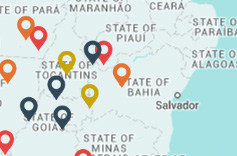Urucum Flower Collective
Right to Resistance: Poço da Draga Community Struggle for Housing and Against Institutional Violence.
Ceará
Objetivos e público prioritário
Develop actions that counteract the embarrassment and institutional violence surrounding property conflicts in the community Poço da Draga (Fortaleza, CE) and its 512 residents, through social intervention and the strengthening of community organization.
Main activities
– Continuing the social mapping activities developed in partnership with the community.
– Developing a social register of the territory, which will provide data to help in land title normalization.
– Training through workshops with residents to update existing social maps.
– Workshops in rights education, including instruments and procedures of the Access to Information Law and accompanying tools for access, as requirements of public organs, verification of information availability and transparency on sites and the Official Register.
– Following events in the municipal legislature.
Context
Poço da Draga is a community located on Iracema Beach, an upscale neighborhood in Fortaleza (CE), and surrounded by a tourist area with various cultural spots. Centenarian, the community grew out of the increasingly busy ports, transportation network and business of the region. However, currently, with the recent arrival of business interests and acceleration of urban transformation projects linked to developments in preparation for the 2014 World Cup, Poço da Draga has lost several of its public spaces and seen its social rights disregarded.
Though designated a Zone of Social Interest (ZEIS), Poço da Draga hasn’t been regulated, and meanwhile the city’s organizational Master Plan has suffered alterations that impede its enforcement. The area is also negatively affected by the tourism and hotel sectors and associated sexual tourism industry.
About the organization
The Urucum Flower Collective was born in 2011 and unites human rights activists from diverse areas who want to defend and promote human rights as a tool for recognition and empowerment of people over subordination due to race, class, gender, ethnicity and generation, thus contributing to their efforts to build alternatives for a radically free, politically plural and environmentally just society.
Partnerships
The Collective is affiliated with the Popular World Cup Committee, the Fortaleza Occupation Network and the Zeis Forum.
Results
Residents were trained to update existing social maps and follow requirements for information access. Social mapping was carried out at Poço da Draga, with the creation of a participatory platform for the mapping that can be operated by the community residents.
Funding Line
Annual Call for Proposals
Year
-
Total Granted
R$ 34,800
Duration
10 months
Main Themes
The right to just and sustainable cities






